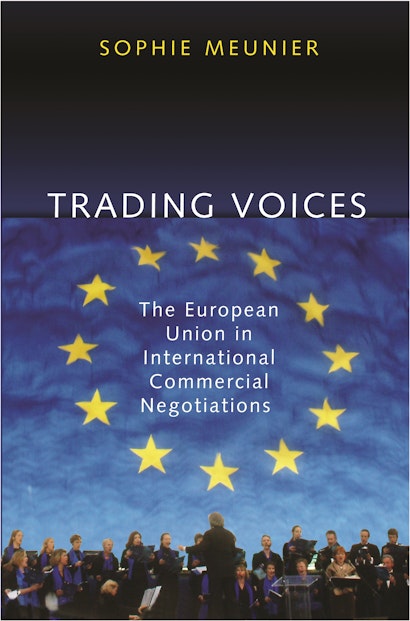The European Union, the world’s foremost trader, is not an easy bargainer to deal with. Its twenty-five member states have relinquished most of their sovereignty in trade to the supranational level, and in international commercial negotiations, such as those conducted under the World Trade Organization, the EU speaks with a “single voice.” This single voice has enabled the Brussels-based institution to impact the distributional outcomes of international trade negotiations and shape the global political economy.
Trading Voices is the most comprehensive book about the politics of trade policy in the EU and the role of the EU as a central actor in international commercial negotiations. Sophie Meunier explores how this pooling of trade policy-making and external representation affects the EU’s bargaining power in international trade talks. Using institutionalist analysis, she argues that its complex institutional procedures and multiple masters have, more than once, forced its trade partners to give in to an EU speaking with a single voice.
Through analysis of four transatlantic commercial negotiations over agriculture, public procurement, and civil aviation, Trading Voices explores the politics of international trade bargaining. It also addresses the salient political question of whether efficiency at negotiating comes at the expense of democratic legitimacy. Finally, this book looks at how the EU, with its recent enlargement and proposed constitution, might become an even more formidable rival to the United States in shaping globalization.
Sophie Meunier is Research Scholar in Public and International Affairs at Princeton University's Woodrow Wilson School. She is the coauthor of The French Challenge: Adapting to Globalization and its French adaptation, Le Nouveau Défi français: la France face à la mondialisation, which received the 2002 France-Amériques book award.
"The book develops a comprehensive, conceptually sophisticated, and very compelling account of the role the EU plays in international trade negotiations. Trading Voices sets the standard for future research on EU trade policy making."—Matthias Kaelberer, Comparative Political Studies
"The book makes a real contribution to our thinking on what is obviously a highly topical and important aspect of EU action. By challenging simple claims and assumption regarding the costs and benefits of 'unity', it compels us . . . to think in more nuanced ways about the EU and its workings."—Anand Menon, European Analysis
"Taken as a whole, Meunier's book represents an important contribution. Not only does it plot a fascinating history of the ebb and flow of the European Commission's negotiating powers, but it also reminds us of how deep-rooted the institutional blockages are that resulted in the collapse of the constitution in 2005, while speaking to the need to remain optimistic following the stalling of the Doha Round in 2006. In this sense, the book is essential reading for all those involved in and fascinated by the operation of international institutions as well as the rules on which individual trading blocs are built."—Christopher J. Gerry, International History Review
"The study brings the best of social science tools to answer the question of how integration theoretically affects international negotiations."—Karen J. Alter, Perspectives on Politics
"This impressive book offers the first authoritative study of the trade policy of the European Union—the world's largest trading block. Trade policy represents a key example of the European Union as a complex bundling of supranational and intergovernmental features. This book offers an excellent balance between theoretical argument and explanation of how the European Union's trade policy works—an essential though highly understudied area of European Union policy-making. It will appeal to those interested in trade policy, the European Union, and the development of international organizations."—Pascal Lamy, Former European Union Trade Commissioner
"Trading Voices is the most theoretically sophisticated, wide-ranging, and compelling book yet on the development of the European Union as a global trading power. It will be useful for scholars and students of the EU and trade policy, as well as government officials on both sides of the Atlantic."—John T. S. Keeler, University of Washington, author of The Politics of Neocorporatism in France
"Trading Voices marks a real contribution to scholarship on the European Union, the international politics of trade, international political economy, and theories of negotiation. Very well written and accessible, it is a theoretically sophisticated, well researched, important piece of work."—Alberta Sbragia, University of Pittsburgh, author of Debt Wish: Entrepreneurial Cities, U.S. Federalism, and Economic Development

